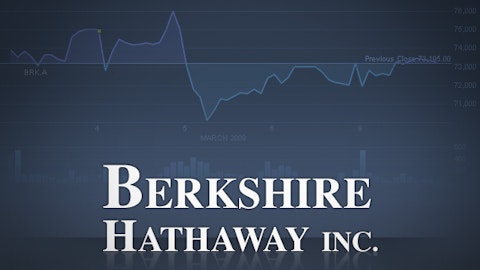In the first quarter of 2013, Warren Buffett accumulated more than 6.5 million shares in the Netherlands energy infrastructure company, Chicago Bridge & Iron Company N.V. (NYSE:CBI). At the current trading price of around $58 per share, Chicago Bridge’s holding is worth $375 million. Since the bottom of 2009, Chicago Bridge has advanced significantly, climbing from nearly $5 per share to nearly $58 per share. Let’s take a closer look to determine whether or not we should follow Warren Buffett into Chicago Bridge & Iron Company N.V. (NYSE:CBI).

Business snapshot
Chicago Bridge is considered one of the global leaders in integrated engineering, procurement, and construction services (EPC). The company announced that it had around 900 projects in more than 70 countries, employing around 27,000 people. Chicago Bridge & Iron Company N.V. (NYSE:CBI) operates in three main business segments: Steel Plate Structures, Project Engineering and Construction, and Lummus Technology.
Most of its revenue, $3 billion, or 54.7% of the total revenue, was generated from the Project Engineering and Construction segment. The Steel Plate Structures segment ranked second with nearly $1.96 billion in revenue while Lummus Technology contributed only $487 million in sales in 2012. Interestingly, the Lummus Technology segment enjoyed the highest operating margin at nearly 26%, whereas the operating margins of the Project Engineering and Construction and the Steel Plate Structures segment were only 4.5% and 9.8%, respectively. Chicago Bridge & Iron Company N.V. (NYSE:CBI)’s EPC services are for big energy and infrastructure companies including Exxon Mobil Corporation (NYSE:XOM), Royal Dutch Shell plc (ADR) (NYSE:RDS.A), CNOOC Limited (ADR) (NYSE:CEO) etc.
Fluctuating revenue but increasing net income
Since 2009, the company has witnessed some fluctuation in revenue. Revenue has fluctuated in the range of $3.64 billion in 2009 to $5.48 billion in 2012, while net income has risen steadily from $174 million to $302 million during the same period. Over the past four years, the company has consistently generated positive but fluctuating cash flow. In 2012, the operating cash flow was $203 million while the free cash flow stayed at $130 million.
What attracts me the most is its consistent double-digit return on invested capital in nine out of the past ten years. Only in 2008, the company produced a loss of $21 million due to a very low gross margin of only 3.92%. According to Chicago Bridge, the lower gross margin was partly due to “continued poor labor productivity, significant weather delays and the need to supplement critical subcontractor areas adversely impacted the schedules for the U.K. Projects and necessitated substantial expenditures during 2008 well above previous estimates.”
Chicago Bridge & Iron Company N.V. (NYSE:CBI) employs decent leverage in its operations. As of March 2013, it had $1.92 billion in equity, $393 million in cash, and nearly $1.9 billion debt. The increase in debt was due to the recent $3.1 billion acquisition of The Shaw Group Inc. (NYSE:SHAW), including $2.9 billion in cash and nearly $499 million in equity consideration. Interestingly, nearly all the debt financing cost a fixed rate of 4.15% to 5.30%, with the principal due 2017 to 2024. Chicago is trading at around $58 per share with a total market cap of $6.2 billion. The market doesn’t seem to value the company cheaply, at nearly 13 times EV/EBITDA. However, incorporating the potential growth, it is relatively cheap at only 0.63 times PEG.
Peer comparison
Compared to its peers Matrix Service Co (NASDAQ:MTRX) and Halliburton Company (NYSE:HAL), Chicago Bridge & Iron Company N.V. (NYSE:CBI) had a higher EV multiple but lower PEG ratio. Matrix Service Co (NASDAQ:MTRX) provides EPC services mainly to 430 oil, gas, and power companies, operating in four main business segments: The Electrical Infrastructure, Oil Gas & Chemical, Storage Solutions, and Industrial. Its two biggest customers, BP plc (ADR) (NYSE:BP) and Enbridge Energy Partners, L.P. (NYSE:EEP), accounted for 11% and 10.7%, respectively, of total 2012 revenue.
